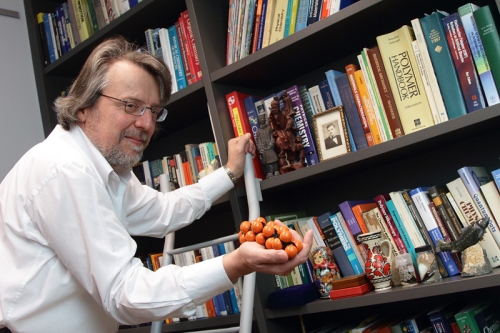"What does chemistry mean to you?"
UT Nieuws Weekblad van de Universiteit Twente, March 17, 2011
What would happen to all of humanity if, with a single brushstroke, you wiped out all the contributions of chemistry from modern life? Say goodbye to pharmaceuticals to cure diseases. Forget about trying to log on your computer, turn on the television or send a text message. ‘Chemistry is essential,’ says Professor Julius Vancso, chair of the Materials Science and Technology of Polymers group. ‘Without it, we would all die a lot sooner. Look around, chemical structures are everywhere.’
© Robbin Engels
In the Netherlands alone, he says around 200,000 people earn their living in industries having to do with chemistry. Officially, this year marks the International Year of Chemistry, proclaimed by the United Nations, in the effort to bring global recognition and celebrate the centennial of awarding the Nobel Prize in Chemistry to Marie Curie-Sklodowska for her scientific work on radioactivity.
In his new office in the Waaier, the native of Hungary says he wants us all to imagine a world without chemistry. ‘Look up at the ceiling,’ he tilts his head. ‘The light bulb, for example, has a special fluorescent coating. Adhesives. Sealants. Soaps. Medicines. The list is long.’ Chemistry is a subject area at the core of his research, and a science, many would argue, of irrefutable necessity for our survival and how we live in today’s world.
Plastics: why the bad rap!
In the world of polymers, familiar synthetic plastics have gotten a bad reputation in the media as an environmentally polluting material. ‘People think plastics pollute the environment. If you see plastic on the ground, the piece of polyethylene may not be pretty, but it does not harm the environment.’ As an example, the professor points to a plastic cup on the table. ‘This is made of polystyrene. One plastic cup consists of long chains of polymer molecules, where the building blocks are all linked together to create a molecule.’
Some years ago, under public pressure, manufacturers stopped producing large quantities of plastic products. Companies such as McDonalds switched to using paper. While everything has its pros and cons, he explains, the paper cups were laminated on the outside and inside with a plastic layer, employing a technique that uses ‘loads of energy’.
In reality, this new product – dubbed to be environmentally friendly – was difficult to recycle. Besides burning it, a process contributing to an increase in air pollution, there aren’t other efficient ways to recycle the product. He mentions other downsides: pulp mills, where paper is produced, contribute heavily to air, water and land pollution. ‘Think about the ecological impact on forest when foresters use ‘cut and field’ techniques to take down trees that otherwise would continue to produce oxygen, moderate ground temperatures and reduce carbon dioxide.’
At the heart of nanotechnology
According toVancso, molecular nanotechnologists use various substrates, whether they are flat or curved surfaces, to manipulate molecules and to build up functional materials. Like a jigsaw puzzle, scientists are putting the pieces together to control molecules, one by one, and build complex functional and responsive structures including polymers, or in other words, the ‘molecular foundation’ of nanotechnology that relies on a vast knowledge of chemical processes. ‘One of the functions we’ve been interested in, as a material scientists, is in building sensors based on polymers in combination with metal and semiconductor nanocrystals, where you use hierarchical structures to sense and label processes in biology and biomedical science applications,’ he explains.
Inroads in bio-medical science
Working across various academic disciplines comes as second nature to Vancso, whose own research group is embedded in the MESA+ Research Institute for Nanotechnology. Scientists work together with various types of polymers, depending on the different angles of application, in a constant exchange of scientific knowledge. ‘On the whole, this is what makes the university an exciting place. We have the opportunity to collaborate with others in a multidisciplinary environment. We cannot be experts in bio- and reaction technologies. You need the cooperation of other scientists.’
In its formative years, advancements in new three dimensional nanotechnology developments are on the horizon, as breakthroughs and discoveries, heavily reliant on the work of material scientists, occur every year and hold the key to unlocking potential biomedical applications. Vancso: ‘One future application is to create a three-dimensional scaffold to examine cell growth. Now we are working on building polymer structures from the bottom up under molecular control for the purpose of anchoring cells in tissue engineering.’
Soon, the elected member of the Hungarian Academy of Sciences and Fellow of the Royal Society of Chemistry says it will be possibly to create new sensing structures, allowing for people to swallow a pill that then binds to a cancer cell in the body. When the surgeon goes to perform surgery, an ultraviolet light illuminates the tumor.’
Cheers to Chemistry
By next fall, plans are in the making to ‘celebrate chemistry in Twente’ with a two to three day scientific fair, symposium and closing party to increase awareness and visibility of chemistry research being conducted at the university, hoping to spark young people’s interest in the subject and make its importance visible to the outside world.
In light of the UN initiative or if you want to discover more on the latest research advances in chemistry, visit chemgeneration.com , a newly launched multimedia site, especially designed for laypeople and young people. The site offers the history of chemistry, important discoveries within the current state of research, and future perspectives.

‘Mind you, without chemistry, we would not even have fire. Fire involves a chemical process when it oxidizes ‘fuel’ at high temperatures,’ says Professor Julius Vancso, while showing a three-dimensional model of a polymer chain. (Photo: Gijs van Ouwerkerk)